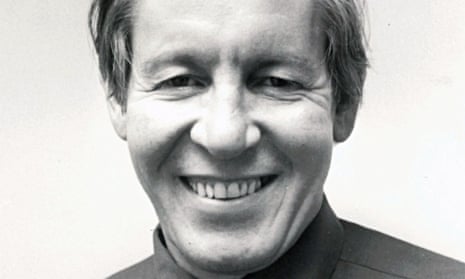The Guardian journalist John Fairhall, who has died aged 86, predicted the coup that brought Idi Amin to power in Uganda, and ended up facing death in one of his infamous jails. For years John was haunted by the sound of his unluckier fellow inmates being sledgehammered to death and wondering whether he would be next. Of the 25 people he shared a squalid, crowded cell with in Makindye prison, Kampala, for four days in September 1972, 15 were murdered.
An Africa specialist since his time in Nairobi, Kenya, on the East African Standard and later on the multiracial Nation newspaper (1959-62), John was a natural choice as the Guardian’s Africa correspondent. His knowledge of the region and his contacts produced the hunch that a coup was imminent in Uganda in 1971. He was there in time for Amin’s first press conference, while the shooting was still going on. Several further trips there ensued, during which he reported the unfolding nightmare as Amin murdered and expelled with impunity. After the prison episode John was deported, and his reportage made him the international correspondent of the year in the IPC press awards six months later.
The experience changed him. He had a wife and young family to whom he was devoted, and he come close to death. He was also banned from Uganda and Kenya, having disclosed secret plans for the balancing of power between competing tribes once Jomo Kenyatta ceased to be president.
He wanted a full-time specialist job, which proved to be that of education correspondent, from 1972. That was when I first got to know him, a tall, gentle, intelligent man, when covering the same subject for the Birmingham Post.
Later I worked with him after he was promoted in 1979 to education editor, a job he fulfilled with great distinction until his retirement on health grounds in 1989. He wrote a splendid weekly column in what was then a new editorial and commercial venture – Education Guardian – holding the education powers of the day to account.
Born in Clacton-on-Sea, Essex, John was the seventh of eight children of William, a first world war cavalryman who went on to drive a taxi and work as an insurance agent, and his wife Millicent (nee Partridge), from a Suffolk farming family. After leaving Clacton County high school, John did national service, following which, in 1949, he had to choose between a place at Birmingham University or a job on the East Anglian Times. He chose journalism.
Within two years he was working in Birmingham across the Gazette, Evening Dispatch and Sunday Mercury, all Westminster Press titles. The high principles that guided his entire career caused him to resign three times in the first year because of the disregard for the truth that he encountered. Twice he was persuaded to stay, but the third time he joined the delightfully named Smethwick Telephone, a weekly that was less important than the Birmingham papers. It was a sign that this young man, though ambitious, was not prepared to compromise.
Next there was another spell in East Anglia, and he was working on the Eastern Daily Press in Norwich when he met Frances, a fellow reporter on the Eastern Evening News, whom he married in 1959. On the EDP he covered news, and was probably the youngest reporter at Suez. He also covered yachting and fitted in art and theatre criticism. He was ambitious and keen to work in London, but there were few jobs to be had for a man of his principles, so he headed to Africa instead.
Back in Britain his brother David had joined what until 1959 was the Manchester Guardian, and when John returned from his three-year spell in East Africa, he dropped in to see his brother at the paper’s office in Cross Street, Manchester. There he met John Anderson, then a multitasking senior editor on the paper, who recalled that they chatted for half an hour about the Great Zimbabwe Ruins, sailing, the Congo, and the International Coffee Agreement, at the end of which Anderson said: “I suppose we can offer you a job.”
So in December 1962, John became the Guardian’s industrial reporter, also covering yachting and agriculture. Fifteen months later he was one of the pioneering group who moved from Manchester to London on the first leg of a journey by a liberal regional newspaper with an international reputation.
He continued to juggle the industrial and Africa beats with general news, which involved much international travel. The Guardian was short of money and journalists were expected to do several jobs. In 1968, when Russia invaded Czecholovakia, he briefly reported from Prague, and in the same year covered the Biafran civil war in Nigeria.
A man of absolute integrity and principle, John was elected to serve as the journalist member of the Scott Trust, the body that owns the Guardian. When Alastair Hetherington stepped down as editor in 1975, he was one of three journalists responsible for establishing who his colleagues preferred as a successor. In those days there were no hustings or secret ballot – the process that resulted in Peter Preston’s appointment was done on the basis of journalists sidling up to John and telling him that they “wouldn’t mind if so-and-so was editor if he or she should apply”.
His family and sailing were John’s greatest pleasures. He explored the rivers and backwaters of the Essex and Suffolk coast in his self-built “gaffer”, The Old Pretender. His last boat, a Dutch scow, took him further afield and across the North Sea. He also became addicted to choral singing at the age of 50, and sang with the University of Essex choir for many years.
He is survived by Frances; three children, William, Holly and Tom; four grandchildren, Leon, Felix, Fleur and Millie; and four siblings, Mary, Hazel, Donald and David.

Comments (…)
Sign in or create your Guardian account to join the discussion